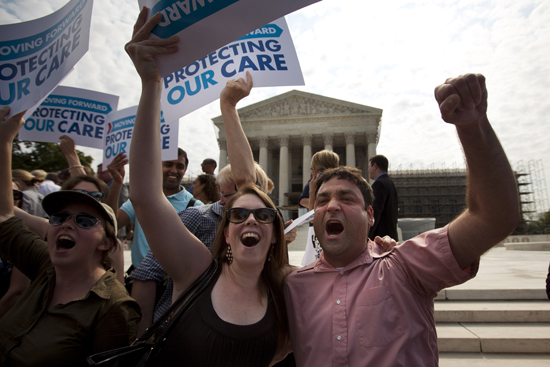Claiming a Place in Health Care History
LAW class brief cited as Supreme Court upholds health law

Supporters of the health law celebrate outside the Supreme Court after Thursday’s ruling upholding the reform. Photo by the Associated Press/Evan Vucci
Two School of Law professors and their students get wee bragging rights for yesterday’s Supreme Court decision upholding most of President Obama’s health care law.
The ruling partly relied, in at least one justice’s mind, on one of several briefs filed by Constitutional Health Care Litigation students and their instructors. The briefs defended the Affordable Care Act (ACA), which will expand health insurance to an estimated 30 million Americans. In her concurrence with Chief Justice John Roberts’ majority opinion, Associate Justice Ruth Bader Ginsburg, addressing opponents’ arguments that states and not the federal government should work to insure Americans, quoted the brief: “Out-of-state residents continue to seek and receive millions of dollars in uncompensated care in Massachusetts hospitals, limiting the State’s efforts to improve its health care system through the elimination of uncompensated care.”
“Facing that risk,” Ginsburg concluded, “individual states are unlikely to take the initiative in addressing the problem of the uninsured, even though solving that problem is in all states’ best interests. Congress’s intervention was needed to overcome this collective-action impasse.”
Kevin Outterson and Abigail R. Moncrieff, both LAW associate professors, developed the class, part of the school’s highly regarded health law program. Moncrieff yesterday lauded the “major victory for the nearly 100-year-long political effort to improve the nation’s health care system.” (Theodore Roosevelt proposed national health insurance in his 1912 Progressive Party presidential campaign.)
The 5-4 Court decision upheld the health law’s linchpin, the “individual mandate” that will require Americans to buy insurance or pay a penalty. The justices dealt a blow to one part of the law, its expansion of Medicaid, the federal-state program paying health expenses for poor people. The Court gave states some wiggle room to avoid the expansion without paying the penalties the law would have imposed.

The surprising lineup in the Court’s decision found conservative Roberts ruling for the law, while swing-vote Justice Anthony Kennedy voted to strike it down. Yet there’s a visible philosophy undergirding Roberts’ judicial approach, says Graham Wilson, a College of Arts & Sciences political science professor and department chair. In another case before the Court this week, Roberts argued that life in prison without parole for minors was constitutional and that “the judgment on that issue should be made by legislators, not the Court,” Wilson says. “He has with praiseworthy consistency said that the health care issue also is to be settled in the democratic political, not judicial, arena.”
That’s because the decision to uphold Obama’s signature legislative achievement—coverage for millions of uninsured people that has eluded presidents since Franklin Roosevelt—shifts opponents’ hopes onto GOP presidential candidate Mitt Romney, who has vowed to repeal what critics dub Obamacare. In a rare break from those pundits stating the blatantly obvious (the ruling was a victory for Obama), Tobe Berkovitz, a College of Communication associate professor of advertising, calls the decision “a gift to the Republicans.”
Citing polls showing the law’s unpopularity with a majority of Americans, Berkovitz says the Court’s reasoning in the case—that the individual mandate’s penalty is a tax and therefore within Congress’ constitutional right to levy—“plays into the Republican meme that Obama and his liberal minions in the House and Senate love taxing the American people.”
Wesley Yin, a CAS economics assistant professor, disagrees. (He begins a one-year stint in August as senior health care economist on Obama’s Council of Economic Advisers.) While economists have long regarded the penalty as a tax and were unsurprised by Roberts’ reasoning, Yin says, Obama has not really raised taxes via the law, because “buying health insurance, as the vast majority of people already do, negates the penalty completely.” Moreover, he says, the law makes many lower-income Americans eligible for tax credits to buy insurance, rather than subjecting them to tax hikes.
Defenders of the mandate have argued that without a requirement to have all Americans pay into the insurance pool, the law’s guarantee of coverage to the sick would be unaffordable. But while the mandate is the most effective way to get that money, there are nonmandatory “carrots,” such as premium subsidies, that could encourage healthy people to buy insurance, Yin argues. If Romney is elected and repeals the mandate, he says, he will have to ponder those carrots while keeping the guaranteed coverage for the sick, which has wide public support.
Bottom line after the decision: “This is clearly a win for President Obama’s first-term legacy,” says Yin. “However, he’ll need to articulate the tangible benefits of the ACA to the American people more clearly than he has in the past, a task made more difficult by what I expect will be a Republican effort to cast Obama as the architect of a ‘bait and switch’ tax on Americans.”
Comments & Discussion
Boston University moderates comments to facilitate an informed, substantive, civil conversation. Abusive, profane, self-promotional, misleading, incoherent or off-topic comments will be rejected. Moderators are staffed during regular business hours (EST) and can only accept comments written in English. Statistics or facts must include a citation or a link to the citation.